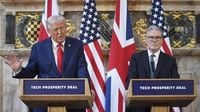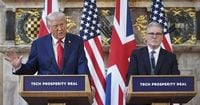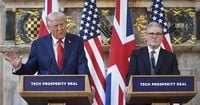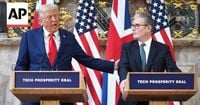Under the gilded ceilings of Chequers, the British prime minister’s country retreat in Aylesbury, England, the air was thick with diplomatic formality—and a hint of tension. On September 18, 2025, President Donald Trump and Prime Minister Keir Starmer concluded Trump’s second state visit to the United Kingdom with a joint press conference that quickly turned into a showcase of both unity and divergence on the world stage.
The most headline-grabbing moment came when President Trump openly disagreed with Starmer’s decision to recognize a Palestinian state. According to Reuters, Trump stated, “I disagree with Starmer’s decision to recognize the Palestinian state sometime this month unless Israel commits to peace in Gaza.” Trump’s stance was clear: any move toward Palestinian statehood must be conditional on Israel’s security and the immediate release of hostages held by Hamas. “I want it to end, but I want the hostages back. I don’t want the hostages used as human shields, which is what Hamas is threatening to do,” Trump said, as reported by OPB.
Starmer, standing just a few feet away, held his ground. Pressed about the timing of the UK’s recognition of Palestine, he was unequivocal: “The timing of this announcement has got nothing to do with this state visit.” He added that Hamas, responsible for the October 7 attacks on Israel, could not have any role in the future governance of Palestine. Starmer’s comments, cited by the Jerusalem Post, underscored a conviction that the UK’s foreign policy decisions are made independently, not as a courtesy to visiting allies.
While the Palestinian issue exposed a fissure between the two leaders, both were keen to emphasize that this was a rare point of discord. Trump himself said, “This disagreement with Starmer is one of our few disagreements.” It was a carefully chosen phrase, perhaps meant to reassure both domestic and international audiences that the Anglo-American alliance remains robust despite occasional policy rifts.
Beyond the Middle East, the press conference turned its gaze toward Eastern Europe, where the war in Ukraine continues to cast a long shadow over global security. Starmer, who has taken a leading role in European efforts to support Ukraine, did not mince words about the recent escalation. “In recent days, Putin has shown his true face, mounting the biggest attack since the invasion began, with yet more bloodshed, yet more innocents killed, and unprecedented violations of NATO airspace,” Starmer declared, as quoted by OPB.
He went on to stress the need for greater Western resolve: “These are not the actions of someone who wants peace. So we’ve discussed today how we can build our defenses to further support Ukraine and decisively increase the pressure on Putin to get him to agree a peace deal that will last.” Starmer’s sense of urgency was palpable, and he called for stepped-up military planning by the UK and France, as well as “an American guarantee” to bolster European security.
President Trump, for his part, expressed deep frustration with Russian President Vladimir Putin. Reflecting on his own efforts, Trump said, “He’s let me down. He’s really let me down,” referring to his failed attempts to broker a peace deal after hosting Putin for talks in Alaska a month earlier. The anticipated follow-up meeting between Putin and Ukrainian President Volodymyr Zelenskyy has not materialized, and Russian strikes on Ukraine have only intensified since then. Trump did not hide his disappointment, calling the lack of progress “my biggest disappointment.” He also pointedly remarked that the war “doesn’t affect the United States,” noting that Starmer was “a lot closer to the scene than we are.”
Starmer countered by highlighting the need for more pressure on the Kremlin. “It’s only when the president [Trump] has put pressure on Putin that he’s actually shown any inclination to move. So we have to ramp that pressure up,” Starmer argued. He added, “What you can see is either an emboldenment or at least an increased recklessness on Putin’s part, and that’s why I said earlier that they’re not the actions of someone who wants peace, so we have to ramp up.”
Despite the heavy focus on geopolitics, the summit was not without its moments of pageantry and business. Trump’s visit began with an opulent banquet at Windsor Castle, hosted by the royal family—a gesture that played to the president’s well-known admiration for royal traditions. The following day at Chequers, the agenda shifted to economic and technological collaboration. Trump and Starmer signed a new agreement to expand cooperation on technology and nuclear energy, with a particular focus on supporting artificial intelligence development. Trump explained that the expansion of nuclear energy would provide the necessary electricity for AI to flourish, a point he emphasized repeatedly during the press conference.
In a surprising aside, Trump revealed that the United States was seeking to regain possession of the Bagram Air Base north of Kabul, Afghanistan. “We want that base back,” he said, though he did not elaborate further. The remark was brief, but it hinted at ongoing American strategic interests in Central Asia, even as the world’s attention remains fixed on Europe and the Middle East.
The press conference capped a whirlwind two-day visit that saw Trump meet with top business leaders from both countries, alongside the formalities of statecraft and ceremony. For the British government, the visit was an opportunity to reinforce transatlantic ties and align on key issues like trade, national security, and technological innovation. For Trump, it was a chance to showcase his diplomatic credentials and reaffirm the United States’ role as a global power broker—even as he navigated the complexities of diverging interests with one of America’s closest allies.
Still, the underlying message from both leaders was one of partnership, even when disagreements arise. The Anglo-American alliance, forged in the crucible of past conflicts and tested by present challenges, remains a cornerstone of the international order. As the world watches the fate of Ukraine and the prospects for Middle East peace, the words exchanged at Chequers serve as a reminder that diplomacy is as much about managing differences as it is about celebrating common ground.




